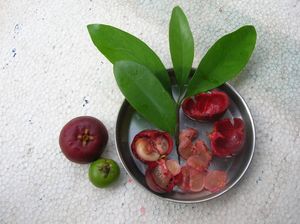Note: This is a project under development. The articles on this wiki are just being initiated and broadly incomplete. You can Help creating new pages.
Garcinia indica - Vrikshamia
Garcinia indica a plant in the mangosteen family. It is native to Asia and Africa. Garcinia indica is indigenous to the Western Ghats region of India located along the western coast of the country.
Uses
Indigestion, Cuts, Snakebites, Diabetes, Cancers, Skin problems, Pimples, Diarrhea, Sore throats.
Food
Garcinia indica can be used in Food. Leaves are used in curry and syrup is made from fruit pulp. The outer rind of the fruit is dried and used in curries. Edible fat from the plant which is known as Kokam butter is also used in some preparations[1].
Parts Used
Chemical Composition
Cyanidin-3-glucoside and cyanidin-3-sambubioside.[2]
Common names
| Language | Common name |
|---|---|
| Kannada | Murgina, Punarpuli |
| Hindi | Kokum |
| Malayalam | Kaattampi |
| Tamil | Murgal, Murgal-mara |
| Telugu | |
| Marathi | NA |
| Gujarathi | NA |
| Punjabi | NA |
| Kashmiri | NA |
| Sanskrit | Vrikshamia, Amlabija |
| English | Kokam, Goa butter tree |
Properties
Reference: Dravya - Substance, Rasa - Taste, Guna - Qualities, Veerya - Potency, Vipaka - Post-digesion effect, Karma - Pharmacological activity, Prabhava - Therepeutics.
Dravya
Rasa
Amla (sour), Madhura (sweet)
Guna
Ruksha (Dry), Guru (heavy)
Veerya
Ushna (Hot)
Vipaka
Madhura (sweet)
Karma
Kapha, Vata
Prabhava
Nutritional components
Garcinia indica Contains the Following nutritional components like - Vitamin-B and C; Citric acid, Malic acid; Hydro citric acid and Garcinol Manganese, Magnesium, Potassium[1].
Habit
Identification
Leaf
| Kind | Shape | Feature |
|---|---|---|
| Simple | Opposite | Estipulate; petiole 5-12 mm long, slender, glabrous; lamina 6.5-11 x 1.5-4 cm, lanceolate or obovate-oblong, base attenuate. |
Flower
| Type | Size | Color and composition | Stamen | More information |
|---|---|---|---|---|
| Polygamodieocious | Axillary and terminal fascicles | Many | Pedicels 6 mm long; sepals 4, yellowish-orange to pinkish-orange, coriaceous, ovate-rotundate, outer ones 3-4.5 mm long, inner ones 4.5-5 mm long. |
Fruit
| Type | Size | Mass | Appearance | Seeds | More information |
|---|---|---|---|---|---|
| Berry | 2.5-4 cm across | 4-8 loculed, purple or wine brown, surrounded by persistent calyx; pulp red | Seeds 5-8, compressed in acidic pulp | {{{6}}} |
Other features
List of Ayurvedic medicine in which the herb is used
Where to get the saplings
Mode of Propagation
Cultivation Details
It can be propagated through soft wood grafts. Garcinia indica requires a warm and humid tropical climate. Garcinia indica is available through December- March[1].
Commonly seen growing in areas
Photo Gallery
References
- ↑ 1.0 1.1 1.2 "Forest food for Northern region of Western Ghats" by Dr. Mandar N. Datar and Dr. Anuradha S. Upadhye, Page No.80, Published by Maharashtra Association for the Cultivation of Science (MACS) Agharkar Research Institute, Gopal Ganesh Agarkar Road, Pune
- ↑ Main constituents
- ↑ FLOWERING PLANTS OF KERALA VER.2, N. Sasidharan-Botanical description
- ↑ Ayurvedic preparations
External Links
- Ayurvedic Herbs known to be helpful to treat Indigestion
- Ayurvedic Herbs known to be helpful to treat Cuts
- Ayurvedic Herbs known to be helpful to treat Snakebites
- Ayurvedic Herbs known to be helpful to treat Diabetes
- Ayurvedic Herbs known to be helpful to treat Cancers
- Ayurvedic Herbs known to be helpful to treat Skin problems
- Ayurvedic Herbs known to be helpful to treat Pimples
- Ayurvedic Herbs known to be helpful to treat Diarrhea
- Ayurvedic Herbs known to be helpful to treat Sore throats
- Herbs with Leaves used in medicine
- Herbs with Fruits used in medicine
- Herbs with common name in Kannada
- Herbs with common name in Hindi
- Herbs with common name in Malayalam
- Herbs with common name in Tamil
- Herbs with common name in Sanskrit
- Herbs with common name in English
- Habit - Tree
- Index of Plants which can be propagated by Seeds
- Index of Plants which can be propagated by Grafting
- Herbs that are commonly seen in the region of Forest lands
- Herbs that are commonly seen in the region of Riversides
- Herbs that are commonly seen in the region of Wastelands
- Herbs
- Ayurvedic herbs that don't have seed photos
- Clusiaceae



